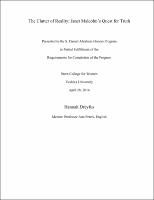Please use this identifier to cite or link to this item:
https://hdl.handle.net/20.500.12202/4087Full metadata record
| DC Field | Value | Language |
|---|---|---|
| dc.contributor.author | Dreyfus, Hannah | - |
| dc.date.accessioned | 2018-11-06T18:08:17Z | - |
| dc.date.available | 2018-11-06T18:08:17Z | - |
| dc.date.issued | 2014-04 | - |
| dc.identifier.uri | https://hdl.handle.net/20.500.12202/4087 | - |
| dc.identifier.uri | https://ezproxy.yu.edu/login?url=https://repository.yu.edu/handle/20.500.12202/4087 | |
| dc.description | The file is restricted for YU community access only. | - |
| dc.description.abstract | “So a novelist is the same as a journalist, then. Is that what you’re saying?” —Question asked by Judge William J. Rea during the MacDonald-McGinniss trial, July 7, 1987 The lines between fact and fiction can easily blur. Janet Malcolm, a contemporary American journalist, has dedicated much of her career to exploring the subtle distinctions between these indefinite lines. With an appetite for controversial subject matter and an aptitude for character-renderings that spare no unflattering detail, Malcolm’s journalistic work has sparked large, uncomfortable questions about the ethics of journalism and the nature of storytelling. Within her diverse body of work, Malcolm’s pointed descriptions of her subjects and striking rhetorical interventions stand out starkly. Her self-conscious ruminations within the text, generous use of ‘I’, and exaggerated criticisms of her field set her work apart from the work of other journalists. What do Malcolm’s conspicuous rhetorical interventions accomplish? How do they alter the reader’s experience of text? Why does Malcolm insist on a constant reminder of her presence and subjectivity? To explore these questions, I will closely analyze three of Malcolm’s most acclaimed works: “Annals of Scholarship: Trouble in the Archives,” Malcolm’s 1983 two-part installment in The New Yorker detailing the controversial story of psychoanalyst Jeffrey Moussaieff Masson; Iphigenia in Forest Hills, the haunting report of a recent murder trial that took place in the insular Bukharan-Jewish community of Forest Hills; and The Silent Woman, a meditation on the art of biography featuring the tragic and widely-disputed figure, Sylvia Plath. In all three works, Malcolm questions a writer’s ability to isolate truth. | en_US |
| dc.description.sponsorship | S. Daniel Abraham Honors Program | en_US |
| dc.language.iso | en_US | en_US |
| dc.publisher | Stern College for Women | en_US |
| dc.rights | Attribution-NonCommercial-NoDerivs 3.0 United States | * |
| dc.rights.uri | http://creativecommons.org/licenses/by-nc-nd/3.0/us/ | * |
| dc.subject | Malcolm, Janet --Criticism and interpretation. | en_US |
| dc.subject | Journalistic ethics --United States. | en_US |
| dc.subject | Journalism --Objectivity --United States. | en_US |
| dc.subject | Interviewing in journalism --United States. | en_US |
| dc.title | The Clutter of Reality: Janet Malcolm’s Quest for Truth | en_US |
| dc.type | Thesis | en_US |
| Appears in Collections: | S. Daniel Abraham Honors Student Theses | |
Files in This Item:
| File | Description | Size | Format | |
|---|---|---|---|---|
| Hannah Dreyfus.pdf Restricted Access | 250.57 kB | Adobe PDF |  View/Open |
This item is licensed under a Creative Commons License

